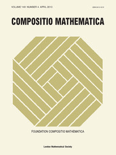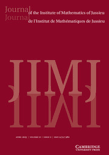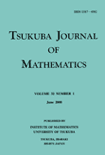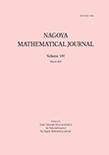
COMPOSITIO MATHEMATICA
Scope & Guideline
Cultivating a Community of Mathematical Scholars
Introduction
Aims and Scopes
- Algebraic Geometry:
The journal frequently publishes articles exploring the geometric properties of algebraic varieties, including moduli spaces, rational points, and intersection theory. - Number Theory:
Several papers delve into number-theoretic aspects, particularly in relation to modular forms, Galois representations, and arithmetic geometry. - Representation Theory:
Research on representations of algebraic groups, Hecke algebras, and their applications in various mathematical contexts is a consistent focus. - Cohomology and Homotopy Theory:
The exploration of cohomological methods and homotopy theory is prevalent, with papers addressing topics such as étale cohomology and derived categories. - Mathematical Physics:
The intersection of mathematics and physics is represented through studies in symplectic geometry, quantum field theory, and related areas. - Geometric Topology:
Research in geometric topology, including studies of manifolds, knots, and their invariants, is also a significant component of the journal's offerings. - Category Theory:
The journal includes works that utilize category-theoretic frameworks to address problems in various mathematical fields, enhancing the understanding of structural relationships.
Trending and Emerging
- Motivic Cohomology and Algebraic Cycles:
There is a growing interest in motivic cohomology and its applications, particularly in understanding algebraic cycles and their properties. - Derived Categories and Homotopical Algebra:
Research involving derived categories, triangulated categories, and homotopical methods is on the rise, showcasing a modern approach to algebraic geometry and representation theory. - Arithmetic Geometry and Moduli Problems:
The exploration of moduli spaces and their applications in arithmetic geometry is increasingly prominent, indicating a strong connection between geometry and number theory. - Noncommutative Geometry:
Noncommutative geometry is witnessing a resurgence, with papers discussing its implications in various mathematical contexts, including algebraic topology and mathematical physics. - Quantum Field Theory and Algebraic Structures:
The interaction between quantum field theory and algebraic structures is emerging, with research focusing on how mathematical concepts can inform physical theories. - Symplectic Geometry and its Applications:
An increasing number of articles are dedicated to symplectic geometry, particularly its applications to both mathematics and physics, reflecting the field's growing importance.
Declining or Waning
- Elementary Number Theory:
Papers focused on classical elementary number theory are becoming less frequent, suggesting a shift towards more advanced or abstract approaches to number theory. - Basic Algebraic Structures:
Research on foundational algebraic structures, such as basic ring theory or field theory, seems to be declining as more complex and applied areas gain traction. - Classical Geometry:
Topics in classical geometry, particularly those that do not intersect with modern computational or algebraic approaches, are observed to be less prevalent. - Real Analysis:
There is a noticeable decrease in papers addressing traditional real analysis, hinting at a possible trend towards more complex or applied analytical methods.
Similar Journals

New York Journal of Mathematics
Catalyzing collaboration in the mathematical community.New York Journal of Mathematics is a prominent open-access journal, published by the ELECTRONIC JOURNALS PROJECT, dedicated to advancing the field of mathematics through the dissemination of groundbreaking research. Since its inception in 1996, the journal has evolved into a valuable resource for researchers, educators, and students, particularly in the realm of general mathematics. As of 2023, it proudly holds a Q2 classification in the Mathematics (miscellaneous) category, reflecting its growing impact and reach within the academic community, despite being ranked at the 31st percentile overall. With its commitment to open access since 2022, the journal ensures that high-quality mathematical research is readily available to a global audience, fostering collaboration and innovation. Researchers interested in contributing to this dynamic field will find the journal a vital platform for sharing their findings and engaging with fellow mathematicians around the world.

Journal of the Institute of Mathematics of Jussieu
Elevating the Standards of Mathematical ScholarshipJournal of the Institute of Mathematics of Jussieu, published by Cambridge University Press, is a leading academic journal that has established itself as a vital resource in the field of mathematics. With an impressive impact factor and a ranking in the top quartile (Q1) of miscellaneous mathematics, the journal serves as a platform for high-quality research from both established scholars and emerging researchers. Spanning from 2002 to 2024, the journal aims to foster collaboration and innovation in the mathematical community by publishing original research articles, reviews, and critical discussions on a wide range of mathematical topics. Although the journal does not offer open access, it remains widely accessible through various academic institutions and libraries, ensuring that critical advancements in mathematics are shared with a global audience. Located in the United Kingdom at the prestigious Cambridge campus, the journal reflects the rigorous standards of its publisher and the rich academic tradition of its home institution.

Documenta Mathematica
Fostering Innovation in the World of MathematicsDocumenta Mathematica is a premier academic journal published by the European Mathematical Society (EMS), making significant contributions to the field of mathematics since its inception. With an Open Access model established in 1996, the journal ensures that scholarly works are freely available to a global audience, promoting widespread dissemination of mathematical research. Based in Germany, it serves as a vital platform for mathematicians, covering a wide array of topics within the discipline, evidenced by its impressive Q1 ranking in the miscellaneous category of mathematics as of 2023. Featuring rigorous peer-reviewed articles that span the latest trends and breakthroughs in the discipline, Documenta Mathematica also retains a commendable position among its peers with a Scopus rank of 163 out of 399, placing it in the 59th percentile for general mathematics. Researchers, professionals, and students alike will benefit from the robust scholarly content and the journal's commitment to advancing mathematical knowledge.

Tsukuba Journal of Mathematics
Empowering Mathematicians to Share Transformative IdeasTsukuba Journal of Mathematics is a distinguished publication dedicated to advancing the field of mathematics through the dissemination of innovative research and comprehensive studies. Published by the University of Tsukuba, Department of Mathematics, this journal serves as a vital platform for mathematicians, researchers, and students to engage with cutting-edge mathematical theories and methodologies. Although currently not available as an open-access journal, it maintains a strong academic presence, contributing significantly to the global mathematical landscape. The journal invites submissions across various branches of mathematics, aiming to foster scholarly communication and collaboration. The ISSN 0387-4982 and the E-ISSN 2423-821X further establish its credibility and accessibility among the academic community, supporting its critical objective of facilitating high-quality research output. Situated in Tsukuba, Japan, a hub for scientific research and development, the Tsukuba Journal of Mathematics is committed to bridging gaps in mathematical knowledge and encouraging exploration of novel ideas.

NAGOYA MATHEMATICAL JOURNAL
Exploring Innovative Frontiers in MathematicsNAGOA MATHEMATICAL JOURNAL, published by Cambridge University Press, is a prestigious journal that has been at the forefront of advancing mathematical scholarship since its inception in 1950. With an ISSN of 0027-7630 and an E-ISSN of 2152-6842, this journal has gained recognition for its high-quality research contributions in the field of mathematics, achieving a Q1 classification in Mathematics (miscellaneous) as of 2023. The journal’s impact is further reflected in its Scopus rank of #164 out of 399 in the General Mathematics category, positioning it within the 59th percentile of its peers. Scholars, researchers, and students can access a range of innovative mathematical studies that explore diverse topics, fostering a vibrant dialogue within the mathematical community. By catering to a global audience, the NAGOYA MATHEMATICAL JOURNAL continues to play a critical role in shaping contemporary mathematical discourse and research.

Forum of Mathematics Sigma
Advancing mathematical frontiers for a global audience.Forum of Mathematics Sigma is a premier open access journal published by Cambridge University Press that has been at the forefront of mathematical research since its inception in 2013. With a strong emphasis on advancing the fields of mathematics, the journal consistently achieves Q1 rankings across multiple categories, including Algebra and Number Theory, Analysis, and Computational Mathematics. This distinction highlights its impact and relevance within the scholarly community. The journal prides itself on providing a platform for innovative research, fostering collaboration among researchers and practitioners across various mathematical disciplines. Open access publication ensures that cutting-edge findings are widely available to readers globally, enhancing the dissemination of knowledge. With an address in the heart of Cambridge, England, Forum of Mathematics Sigma is dedicated to promoting high-quality research and making significant contributions to the development of mathematics.

JOURNAL OF THE EUROPEAN MATHEMATICAL SOCIETY
Fostering Collaboration in Mathematical ExcellenceThe JOURNAL OF THE EUROPEAN MATHEMATICAL SOCIETY, published by the EUROPEAN MATHEMATICAL SOCIETY (EMS), stands as a premier platform in the field of mathematics, known for its rigorous editorial standards and impactful contributions to both applied and theoretical aspects of the discipline. With a commendable Q1 ranking in both Applied Mathematics and Miscellaneous Mathematics categories, alongside a Scopus rank of 32 out of 399 in General Mathematics, this journal has established itself as a crucial resource for researchers and professionals. Since achieving Open Access status in 2021, it has expanded its reach, making cutting-edge research more accessible to a global audience. With a publication horizon extending from 2002 to 2024 and a dedicated focus on high-quality mathematical scholarship, the journal continues to foster innovation and collaboration within the mathematical community.

Epijournal de Geometrie Algebrique
Connecting Scholars in Algebra and GeometryEpijournal de Geometrie Algebrique is an esteemed open-access journal dedicated to advancing the fields of Algebra and Number Theory, as well as Geometry and Topology. Published by the CENTRE COMMUNICATION SCIENTIFIQUE DIRECTE-CCSD in France, this journal has gained recognition for its commitment to disseminating high-quality research since its inception in 2017. With an impressive positioning in the prestigious Q1 quartile for both categories as of 2023, it occupies a notable space in the academic landscape. The journal aims to provide a platform for scholars to share innovative findings and foster collaborations within the mathematical community. Researchers, professionals, and students will find valuable resources, insights, and a vibrant forum for discussion in this journal, which reflects the dynamic evolution of algebraic and geometric studies. Access to all articles is freely available, ensuring that knowledge is accessible to a broader audience, thus promoting ongoing discourse and discovery in these critical branches of mathematics.

CANADIAN JOURNAL OF MATHEMATICS-JOURNAL CANADIEN DE MATHEMATIQUES
Elevating research standards in the world of mathematics.Canadian Journal of Mathematics - Journal Canadien de Mathématiques is a prestigious peer-reviewed journal published by Cambridge University Press, which aims to advance the field of mathematics through the dissemination of high-quality research articles. With its ISSN 0008-414X and E-ISSN 1496-4279, the journal plays a pivotal role in fostering mathematical research and collaboration. It has been recognized for its impactful contributions, currently holding a category quartile ranking of Q2 in Mathematics (miscellaneous) for 2023 and sits in the 66th percentile among its peers according to Scopus rankings. As the journal continues its convergence from its inception in 1994 through to 2024, it remains a vital resource for researchers, professionals, and students seeking to stay at the forefront of mathematical developments. The journal does not operate under an open access model, allowing for a curated collection of articles that adhere to rigorous academic standards.

Selecta Mathematica-New Series
Unveiling Groundbreaking Insights in Mathematics and Physics.Selecta Mathematica-New Series is a premier academic journal published by Springer International Publishing AG, based in Switzerland. With an impressive impact in the fields of Mathematics and Physics, it is recognized in the Q1 category for both Mathematics (Miscellaneous) and Physics and Astronomy (Miscellaneous) as of 2023. Established in 1995, the journal provides a platform for rigorous peer-reviewed research, facilitating the dissemination of groundbreaking findings and theoretical advancements through its converged publication years up to 2024. Researchers and scholars seeking to stay at the forefront of mathematical and physical sciences will benefit from the journal's diverse scope and high-impact articles. Although it does not operate under an open-access model, Selecta Mathematica-New Series remains a vital resource for building knowledge and fostering collaboration among professionals and students engaged in these dynamic fields. Access to its content is essential for those aiming to deepen their understanding and contribute to the ongoing dialogue within the scientific community.